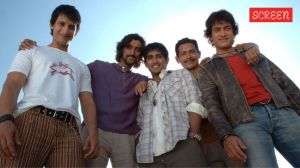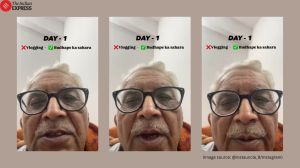145;Record: I am an Arab!146;
Mahmoud Darwish, the incomparable poet of Palestinian experience, of exile, and of resistance, has slipped...

Mahmoud Darwish, the incomparable poet of Palestinian experience, of exile, and of resistance, has slipped into the absence he so often invoked in his poetry. Darwish, who was born in the spring of 1942 in a Palestinian village that no longer exists, died last week in a hospital in Houston, Texas. He was sixty-seven years old, the poet laureate of the Palestinians, a towering figure in Arabic literature, and one of the greatest poets of the twentieth century. He had published over 30 volumes of poetry and prose, been translated into 35 languages, and received numerous awards including the 1969 Lotus Prize from the Union of Afro-Asian Writers, the 1983 Lenin Peace Prize, and the 2001 Lannan Foundation Prize for Cultural Freedom.
But Darwish8217;s unparalleled popularity in the Arab world extended far beyond literary circles. He enjoyed a rare iconic status that few poets since Pablo Neruda or Faiz Ahmad Faiz can claim. His public appearances drew excited crowds that could fill football stadiums, his writing caused heated debates in the Israeli Knesset, and his words have been immortalised as anthems of the Palestinian struggle by the immensely popular Lebanese musician Marcel Khalife.
Darwish8217;s own life played no small part in this strong identification between the poet and his homeland. He was born in Al-Birwa, a village in the Galilee, at a time when Palestine was under the British Mandate. The nakba or catastrophe of 1948 struck when he was barely seven years old, and Jewish militias destroyed Al-Birwa along with more than 400 other Palestinian villages. Darwish8217;s family fled to Lebanon. When they returned a year later to what used to be their home, their village no longer existed, and from the standpoint of the new state of Israel, neither did they. Darwish, like thousands of other Palestinians inside Israel, became an internal refugee living under a system of military rule and legally classified in terms only Orwell could match: a 8220;present-absent alien.8221;
At twelve, the young writer was warned by a military governor of the dangers of subversive poetry when he recited a poem on the anniversary of Israel8217;s founding about Palestinian dispossession. But Darwish, afflicted with what he would later call 8220;an incurable malady called hope,8221; never stopped writing, despite being jailed five times for his poetry. And as he wrote he became a voice for a people whose very existence was consistently denied, perhaps most famously by former Israeli Prime Minister Golda Meir who asserted that 8220;there is no such thing as Palestinians.8221; One of his earliest published poems, 8220;Identity Card,8221; begins with the declaration: 8220;Record, I am an Arab!8221;
In 1971 as Darwish left the Galilee to study in Moscow, he was stripped of his citizenship by Israel. For the next quarter century he became the pre-eminent poet of exile, writing about resistance, memory, history, language, love, borders, homelands, and homelessness. He was only allowed to return to the West Bank in 1996, after the establishment of the Palestinian Authority. Until then Darwish was permanently on the move, living in and out of suitcases, airports, and hotel rooms in Beirut, Cairo, Amman, Tunis, Cyprus, and Paris. In Beirut Darwish wrote some of his most powerful verses about the Israeli siege of the city and massacres of Palestinians in Lebanon. Continuing his earlier political activism 8212; he had been involved with the Israeli Communist Party and edited their newspaper 8212; he joined the executive committee of the Palestinian Liberation Organisation PLO in the early 1970s. His commitment to the Palestinian national struggle remained but his investment in organised politics did not last forever. Like his close friend Edward Said, Darwish also became deeply disillusioned with Yasser Arafat over the signing of the Oslo peace accords and resigned from the PLO in 1993.
Notwithstanding his close association with Palestinian history and experience, Darwish, like all great poets, does not belong to his people alone; the beauty of his art is universal. In his later years his writing expanded and engaged a variety of historical experiences, drawing from Greek mythology, Native American and Near Eastern history, and Qur8217;anic and Biblical references. But echoes of the Palestinian experience would remain. In his poem 8220;The Speech of the Red Indian,8221; he wrote: 8220;O you who are guests in this place, leave a few chairs empty/ for your hosts to read out / the conditions for peace / in a treaty with the dead.8221; Last year Darwish lamented: 8220;How difficult it is to be Palestinian, and how difficult it is for a Palestinian to be a writer or a poet . . . How can he achieve literary freedom in such slavish conditions? And how can he preserve the literariness of literature in such brutal times?8221;
Indeed the times are brutal. Israel8217;s devastating blockade of Gaza continues, the daily humiliation and abuse of Palestinians at checkpoints shows no sign of abating, illegal Jewish-only settlements in the West Bank are expanding, and a just peace remains beyond reach. And even in death, Darwish was denied his dream of return. The Israeli authorities refused to allow him to be buried in his birthplace of Al-Birwa inside Israel. He was buried Wednesday in Ramallah after a state funeral attended by tens of thousands of mourners.
An exile since the age of seven, Darwish could only return to language and he found a home in poetry like few others have been able to. And his words will always remain, despite his absence, forever present, 8220;beyond the last frontier / after the last sky.8221;
The writer is an NYC-based producer for a daily radio and TV news show, Democracy Now! and the managing editor of Arab Studies Journal
- 01
- 02
- 03
- 04
- 05































